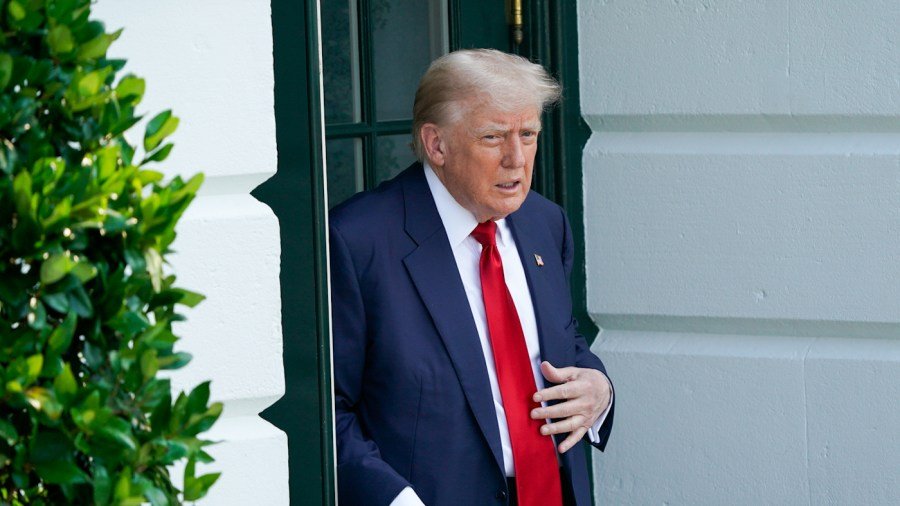
President Trump is facing his most challenging political moment of his second term, with rough poll numbers and growing furor over his administration’s handling of the Jeffrey Epstein case.
Trump saw some of his lowest approval ratings of his second term over the past week, with his net approval in the Decision Desk HQ (DDHQ) average falling to more than 9 points underwater. He’s seen declines, in particular, among independents and on his handling of certain key issues like immigration.
At the same time, he’s trying to tame an ongoing headache stemming from the controversial case of the financier and convicted sex offender.
While his numbers certainly haven’t bottomed out, they indicate to a tough moment for Trump after a series of major victories in recent months.
Lee Miringoff, the director of the Marist University Institute for Public Opinion, said Trump’s quickly shifting political fortunes are part of his skill at “keeping the focus moving all the time,” which requires redirecting people’s attention to his benefit.
“But you do take a cost that your victories are short-lived, and the net effect is there’s still an awful lot that people feel has not been accomplished and that he hasn’t fulfilled a lot of campaign promises, even though some of it clearly was written and spoken of during the campaign,” he added.
Just a few weeks ago, Trump was in a considerably stronger place politically. His “big, beautiful bill” was able to overcome a number of congressional roadblocks, and he signed it into law on July 4, his previously stated goal.
In June, the Supreme Court didn’t settle the legal scrutiny around Trump’s executive order to end birthright citizenship, but it handed him a win by stopping lower-court judges from issuing nationwide injunctions.
That same month, the number of immigrants detained after crossing the U.S.-Mexico border illegally dropped to a record low, and Trump ordered strikes on Iran’s nuclear facilities, followed by a ceasefire between Israel and Iran that’s held.
In the lead-up to and during some of that time, Trump’s approval rating showed signs of modest improvement. His net approval rating fell underwater for the first time in the DDHQ average for his second term in early March, and it stayed net negative through the end of his first 100 days back in office.
It started to tick up in mid-May, and his approval rating returned to net positive for a day on June 5.
But since then, several measures of the public’s opinion on the administration have been going in the wrong direction for Trump.
His net approval rating reached its lowest point yet in the DDHQ rating Monday, falling 9.2 points in the negative, while his disapproval rating in the RealClearPolitics average reached its highest point Wednesday at 52.7 percent.
Some polls have been better for Trump, with an Emerson College Polling survey only showing him 1 point underwater, but multiple major pollsters have found him trending in the wrong direction recently, including Morning Consult, YouGov/The Economist and Gallup.
The Gallup poll could particularly be a warning sign for Trump and the GOP, with 37 percent of respondents saying they approve of his job performance, down from 40 percent last month and 43 percent in May.
The major group driving the downturn appears to be independents, with only 29 percent saying they approve of him, equivalent to the lowest level he had with them through either of his terms in office.
Democratic strategist Joe Caiazzo said the numbers are evidence that any grace period Trump enjoyed has ended.
“The honeymoon is over because, per usual, the chaos and instability of the Trump administration has not led, has not resolved, has not given the results the working people need to improve their daily lives,” he said.
He pointed to continued inflation amid Trump’s tariff policy, along with the public witnessing major raids from Immigration and Customs Enforcement (ICE) agents detaining people at places like schools, hospitals and churches.
One eye-opening finding from recent polling has been Trump starting to struggle with how the public views his handling of immigration, an issue that has long been one of his biggest strengths.
A Reuters/Ipsos poll found this month that the president’s approval on the issue fell to a second-term record low of 41 percent. The downturn began after the increase in ICE raids in California.
A poll from The Associated Press-NORC Center for Public Affairs Research gathered similar findings.
Meanwhile, the Epstein files have dominated national attention for the past few weeks and have stirred significant backlash, including from some of Trump’s MAGA base.
An Emerson poll showed more than half of all respondents disapproved of Trump’s handling of the Epstein files, while only 16 percent approved.
Republicans have indicated they weren’t too concerned about the polls, pointing to the Democrats’ record-low approval ratings of late and the continually steady support Trump has among his base. Despite the frustration related to the Epstein files, polls haven’t found any notable drop in Republicans’ backing of Trump, with 85 percent to 90 percent approving of him in most cases.
Republican strategist Dave Carney said the Epstein case is a “distraction” compared to other issues that the average person cares about, like affordability. He said he’s not worried about this becoming a major issue for now, but the administration should release the documents to move on.
“Communications is a vital part of getting anything accomplished,” Carney said. “They just got off on the wrong foot on this. They just need to fix what they can and move on.”
Republican strategist Brady Smith argued that a benefit for Trump of not having to worry about reelection is he can move forward with policies that he believes are in the country’s interest even if the poll numbers suggest they’re not popular.
“One of the big takeaways here is with the president unable to seek another term in the White House, he doesn’t have to play to the polls as much,” he said. “He’s able to put into practice what he campaigned on, and deportations and securing of the border was top of the list. Voters knew what they were voting for at the time.”
But Democrats are hoping the numbers and pressure on Trump will be an opportunity for them as they look toward the midterms, particularly as Trump’s signature legislative achievement, the “big, beautiful bill,” also has performed poorly in the polls.
“There are no future electoral consequences for him,” Democratic strategist Roy Occhiogrosso said. “There are future electoral consequences as soon as next year for the Republican Party.”
Despite Trump following through on campaign promises like instituting tariffs and rooting out illegal immigration, Miringoff said the shift among independents and others against Trump on key issues may illustrate the difference between campaigning and governing.
“It hasn’t looked as nice as it was packaged running against the Democrats,” he said, adding that implementing the tariffs has been “more complicated” than how Trump described it in his campaign messages.
He said Trump’s “magic” always has been “keeping the ball moving” so the public’s attention doesn’t stick too much to any one issue, but he’s having more difficulty moving on from these issues dragging him down in polling.
“He’s been masterful at that throughout his public career, and now he’s having significant problems turning the page,” Miringoff said.

